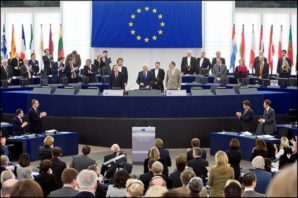
Lately European Union pays more and more attention to the energy security and as the European authorities say they do their best to diversify the energy sources. All of this is done to get rid of the influence of Russia which is always trying to lay down conditions and to blackmail the European countries. Both small and big.
Understanding the situation it is obvious that Europe . In fact nothing was done in order to talk with Russia as an equal.
The European Commissioner Oettinger has already said a lot about consumptions cuts of Russian gas. But finally Gazprom finished its North stream project and there is no doubt it will construct the South stream. European Nabukko lost its attractiveness since the prospects of Azeri-Turkish TANAP became more real, but nobody can answer the question: What’s next? In fact the Azerbaijanian are not so great, Turkmenian can not be transported to Europe without Transcaspian pipeline. That’s why Russia builds expensive South stream, so the EU becomes dependent on Russian gas surrounded by Russian pipelines in North and South. The European Southern Corridor project failed.
But even without Southern corridor Europe has great potential to diversify energy supplies. There are more than 20 LNG terminals on the territory of the EU which can process gas volumes, comparable with the Russian import. The US support in this situation is , in fact some of the US companies have already got a license to export LNG non free-trade agreement countries. It is worthy to mention that Canada is seeking for of its own LNG. There are also Qatar, Australia and other exporters of LNG. In case the EU sets the proposed by Donald Tusk Energy Community aimed to reduce the energy dependency on Russia, its primary task must be the replacement of Russian gas by imported LNG.
Another aspect worthy of note is Russian desire to increase its gas storage capabilities on the EU territory. For the last ten years Gazprom tries to purchase a stake in all European underground gas storages. And it really succeeds in its plans. The company independently will implement its ambitious plans in Western Europe. Austrian underground gas storage Haidaсh (2.8 bcm capacity), German Katharina (0.7 bcm capacity), Serbian Banatskiy Dvor (0.8 bcm capacity), Dutch Bergermeer (4.7 bcm capacity) are working for the Russian gas giant. But Gazprom also has long-term contracts on access to underground gas storages of other European states. Gazprom is carrying out the feasibility studies of underground gas storage projects in Great Britain, Romania, Turkey, Slovakia, France. The Russian authorities set the clear tasks to Gazprom – increase the gas storage capabilities up to 5 bcm in 2015 and up to 5% of annual export in 2030. According to the official statement priority is given to its own capabilities, not rented.
Today Russia is blackmailing the EU using the Ukrainian gas crisis as a tool to get as many advantages as possible:
Consent of the EU to introduce the new scheme of underground gas storage utilization;
Permission of the EC to increase gas supplies via North Stream;
Control over the OPAL gas pipeline, which will free Russia’s hands at the European gas market;
Change of the EC position on South Stream project, that will result in energy dependency of Southern and Eastern European countries.
The European countries must be united in struggle against Russian energy expansion and not to give reasons for blackmailing. The imposing has led to Russia’s understanding of its vulnerability. It made an effort to compensate possible losses in the energy sphere and signed the big gas contract with China. The US State Secretary John Kerry said that this contract was not connected with events in Ukraine, but the European experts say the opposite. The energy sales make 60% of Russia’s budget income and lion’s share of this income – from the EU.
To resist Russia in the energy sphere – this is the real chance to make it more compliant. Main tasks of the newly-elected EP are:
reject expensive Russian gas pipeline projects that make gas more expensive;
utilize regulation of the 3rd energy package for all parties with no exceptions;
make real steps to diversify the energy supplies.

